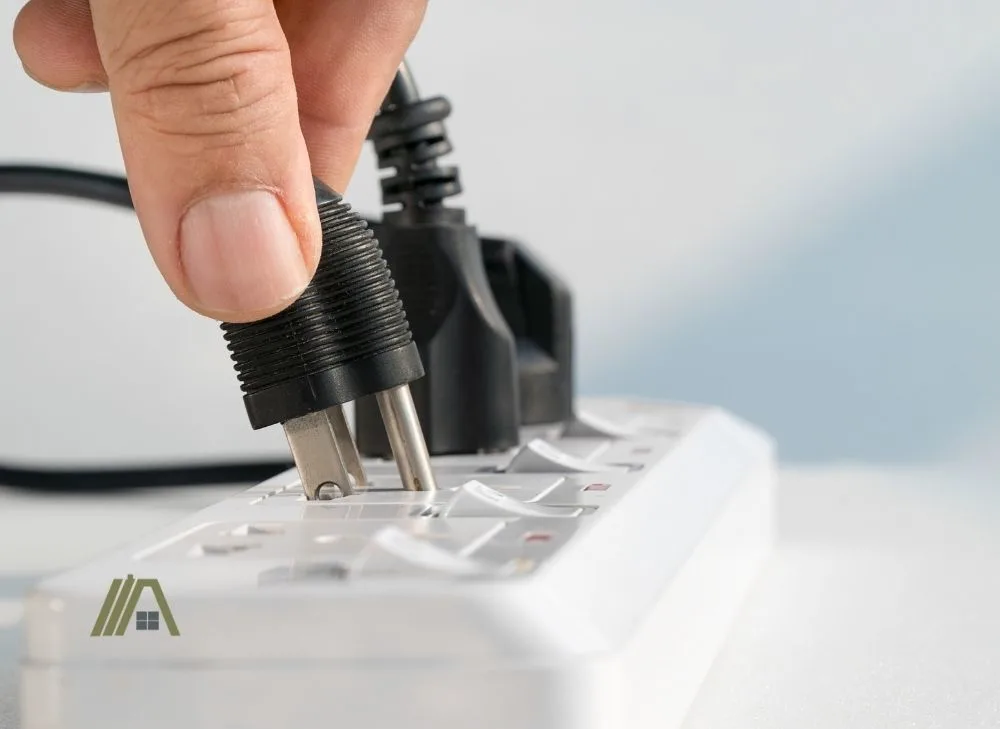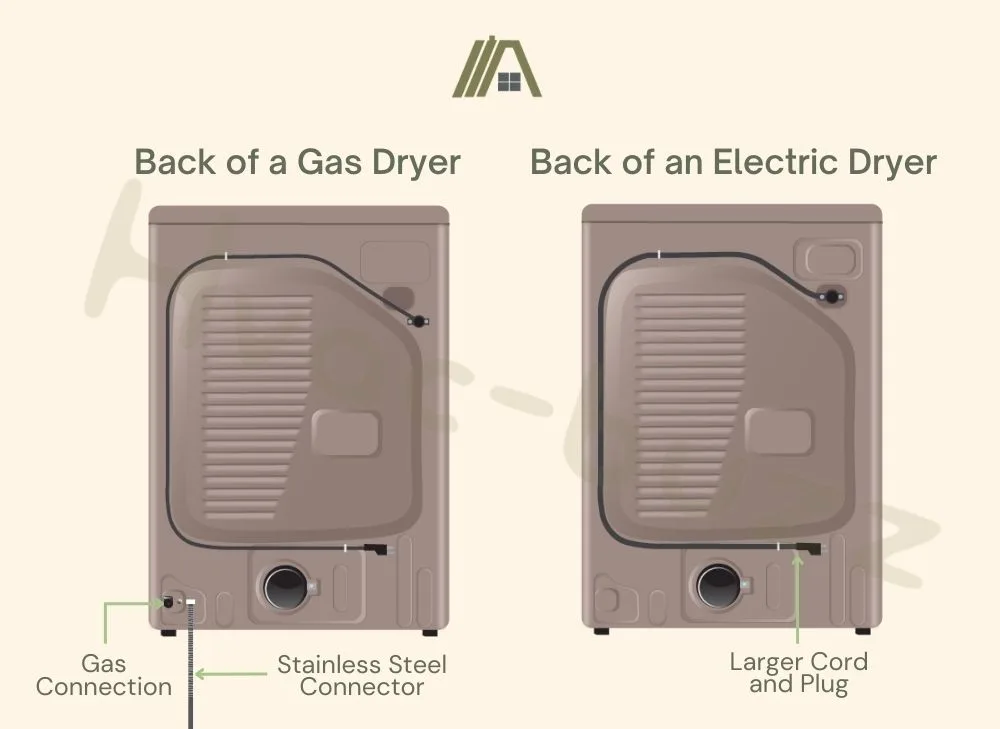All dryers operate in a similar fashion regardless of whether they are electric or fueled by gas. The difference lies in how the heat is generated. Heating is powered solely by electricity in electric dryers. Gas dryers use natural or propane gas burners.
However, there is confusion surrounding gas dryers, which you would think function on gas alone, but which actually require a certain measure of electricity. This doesn’t make them electric dryers, nor are they nominally considered to be both gas and electric. Let’s look at the functioning of gas and electric dryers, converting between the two, and how to tell what type of dryer you have.

Nominally, dryers are either gas or electric. But the name refers only to the way in which the dryer produces heat. Electric dryers are fully electric; all the functions and operations thereof are powered by electricity. Gas dryers only use gas to provide heat. Electricity powers all other operations.
Gas Dryers Use Electricity
There are two types of gas-powered dryers. Some are fueled with natural gas while others use liquid propane gas.
Although gas dryers don’t rely on electricity to dry clothes, there are certain functions that cannot be fuelled by gas and require electricity in the same way as electric dryers.

Just like electric dryers, gas dryers blow warm air into a rotating drum to dry clothes. However, gas dryers utilize a gas burner system to generate the warm air. The warm air is dispersed to the tumbling clothes inside.
This cycle repeats as the moist air is vented outside and replaced by more warm air (you cannot have a ventless gas dryer).
Essentially, a gas dryer requires electricity to power its basic operations, such as the igniter, rotating drum, fan, lights, and main controls. The drum is surrounded and turned by a belt that connects to a pulley powered by an electric motor.
The electrical components of a gas dryer require significantly less power (about 120 V and 4 amps) compared to the electrical components of an electric dryer.
Despite requiring less electricity, gas dryers must be connected to a properly grounded outlet just like an electric dryer. They are, however, less likely to need a dedicated circuit than electric dryers.
While costing more to purchase upfront, gas dryers are more energy-efficient and cost-friendly as natural gas and propane usually run cheaper. However, keep in mind the cost to install a gas line is expensive and should be done by a professional technician.
If you do find yourself with a properly installed gas dryer, the lifetime of that dryer will be longer than an electric one. Gas dryers also dry clothes more quickly and are, therefore, gentler on fabrics at specific temperatures.

For a more detailed list of the advantages and disadvantages of gas dryers, check out my article Gas Dryer Pros and Cons.
For more details, you can read through my article on Gas Dryer Electrical Requirements (Easy to Understand Guide).
Gas Dryers Don’t Use Electricity to Dry Clothes
Gas dryers require electricity to run the basic operations of the dryer as stated above. However, the main function of the dryer—the generation of heat—comes from a gas burner fueled by either natural or propane gas.
If your gas dryer runs out of gas (propane) or there is a problem with the gas line supplying the dryer, the machine will operate but it will not be functional, if I could put it in those terms. However, without electricity, a gas dryer is also not functional.
The gas supplied to your gas dryer is ignited through an electric conductor. If this conductor doesn’t reach a high enough temperature, the gas will not be ignited to heat the air. There will also be no control panel on which to choose the programs.
Electric Dryers Only Run on Electricity
Electric dryers don’t require a gas line to supply them with natural gas or propane. Powered exclusively by electricity, electric dryers utilize a heating coil. Electricity is sent through the coil to create a buildup of energy or heat, which is then transferred throughout the dryer by a fan.
The circulation of air is the most important feature of a dryer and determines how long your load of clothes will take to dry. Simply put, air from the outside of the house is taken in, heated, and distributed throughout the dryer by a fan. The heated air is what helps draw moisture from your clothes.
The moisture-filled air is blown through the back of the dryer through the lint screen. This is a continuous cycle throughout the duration of the drying period. Any sort of blockage in the venting will slow down the drying process and should be monitored if drying seems to be taking longer than usual.
When installing an electric dryer, it’s important to keep in the mind the energy requirements. Operating on electricity only, electric dryers require a significant amount of electricity.
Electric dryers require an electrical outlet equipped with a minimum of 240V and must be grounded. Plugging a dryer into an ordinary outlet will not work and can also lead to serious safety concerns.

The use of extension cords with dryers should also be avoided to further mitigate risks.
Can You Convert a Gas Dryer Into an Electric Dryer?
You should not convert a gas dryer into an electric dryer. It’s not impossible to do, but for the average person it’s not a very feasible task as the amount of knowledge and experience required is extensive. Not to mention the cost for such a labor-intensive project makes it even more absurd.
Most experts will tell you not to take on this sort of project and there are a variety of reasons for that.
Considering an electric dryer runs on a higher current than a gas dryer, the wiring would need to be replaced in order for it to support the higher voltage. Not only is this a hassle but also potentially dangerous if done incorrectly.
Also, gas dryers come with different parts than electric ones in order to support the supply of gas. In short, the parts that even make it a gas dryer would need to be removed and replaced with the parts of an electric dryer. Again, not an easy task.
If you do not have a gas line but you have a gas dryer, rather consider converting it to a propane dryer, which is a very simple task in comparison.
How to Tell if Dryer Is Gas or Electric
Telling the difference between a gas and electric dryer is not too difficult if you know what to look for.
The quickest way to tell the difference is to look at the connections located on the backside of the dryer. You may need to pull the dryer out a few inches to be able to see the cords properly.
Once you’ve got a line of sight on the backside connections it’s very easy. An electric dryer will have only one cord connecting to the outlet while a gas dryer will have a cord connecting to the outlet as well as a thin, stainless steel connector that connects it to the gas supply.
If for whatever reason you don’t see a gas supply connection and you’re still not convinced it’s an electric dryer, consider the width of the cord connecting to the outlet.
Since electric dryers require more electricity to operate, those cords will be larger than a standard plug and, therefore, larger than the plug of a gas dryer.

If you don’t fee like moving the dryer, there are other ways to tell the difference that don’t involve shifting it at all.
Sources
https://www.hometips.com/how-it-works/clothes-dryers-gas.html
https://www.thespruce.com/gas-dryer-vs-electric-dryer-2146251
https://www.hunker.com/13410372/does-a-gas-dryer-plug-into-a-special-outlet
https://homeguides.sfgate.com/causes-gas-dryer-stop-heating-69469.html
https://www.digitaltrends.com/home/gas-dryers-vs-electric-dryers/
https://www.thespruce.com/how-does-a-clothes-dryer-work-2145846
https://howtofixit.net/can-a-gas-dryer-be-converted-to-electric/
https://inspiration.kenmore.com/determine-whether-gas-electric-dryer/
